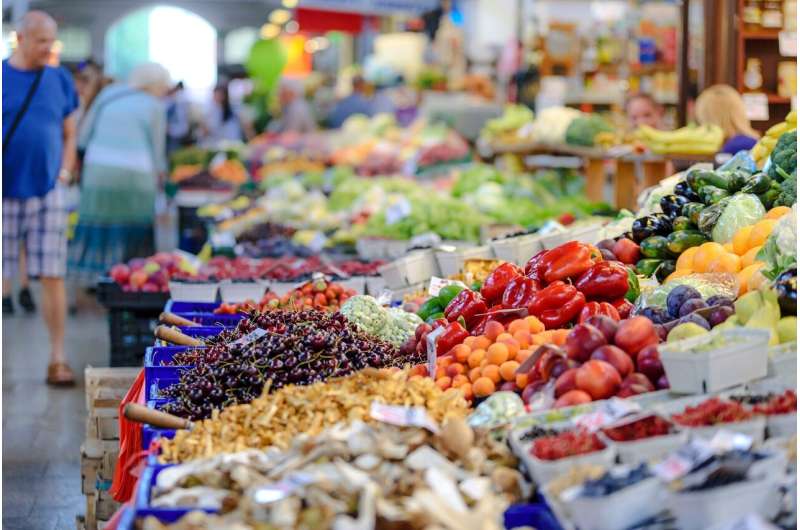Retailer price promotions increase waste awareness, not waste, says study
Contrary to what is often assumed, retailer price promotions such as “Buy One, Get One” or quantity discounts in supermarkets do not cause more food to go to waste. In fact, such offers appear to increase consumer awareness of the risk of wasting food, which in turn spurs them on to prevent waste. Supermarkets could encourage such awareness-driven behavior by designing smart campaigns that help prevent waste.
This is one of the main findings of a follow-up study of the effect of retailer price promotions in supermarkets on food waste conducted by researchers from several universities, including Tilburg University, Vrije Universiteit Amsterdam, and Wageningen University. The first study showed that retailer price promotions reduce waste; the follow-up study shows why.
Lead researcher Arjen van Lin (of the Marketing Department of the Tilburg School of Economics and Management): “What we see is that while price promotions often make consumers buy more than they would normally do, they then also try to avoid wasting the surplus they bought. To reduce food waste even further, one of our recommendations to supermarkets is to consider using other types of ‘1+1 free’ offers that will heighten awareness even more, like ‘1 now +1 free later’ or ‘1 to go + 1 to freeze.'”
Published in the Journal of Consumer Research, the study was conducted in collaboration with GfK, the leading market research agency in the Netherlands: over nine weeks, scanner panel data were collected on households shopping at AH. One to two weeks after having bought specific products (certain vegetables, fruits, and bread products) at the regular price or at the promotional price, customers would be asked to participate in a questionnaire about what they did with these products. Analyzing the date, the researchers found that when consumers buy more than they would normally do, they are more concerned about the risk of wasting food. This concern drives more conscious behavior, encouraging consumers to increase their efforts to prevent food waste, for example by freezing some of the food they buy.
More information:
Arjen van Lin et al, Does Cash Really Mean Trash? An Empirical Investigation into the Effect of Retailer Price Promotions on Household Food Waste, Journal of Consumer Research (2023). DOI: 10.1093/jcr/ucad018
Citation:
Retailer price promotions increase waste awareness, not waste, says study (2023, March 30)
retrieved 30 March 2023
from https://phys.org/news/2023-03-retailer-price-awareness.html
This document is subject to copyright. Apart from any fair dealing for the purpose of private study or research, no
part may be reproduced without the written permission. The content is provided for information purposes only.

Contrary to what is often assumed, retailer price promotions such as “Buy One, Get One” or quantity discounts in supermarkets do not cause more food to go to waste. In fact, such offers appear to increase consumer awareness of the risk of wasting food, which in turn spurs them on to prevent waste. Supermarkets could encourage such awareness-driven behavior by designing smart campaigns that help prevent waste.
This is one of the main findings of a follow-up study of the effect of retailer price promotions in supermarkets on food waste conducted by researchers from several universities, including Tilburg University, Vrije Universiteit Amsterdam, and Wageningen University. The first study showed that retailer price promotions reduce waste; the follow-up study shows why.
Lead researcher Arjen van Lin (of the Marketing Department of the Tilburg School of Economics and Management): “What we see is that while price promotions often make consumers buy more than they would normally do, they then also try to avoid wasting the surplus they bought. To reduce food waste even further, one of our recommendations to supermarkets is to consider using other types of ‘1+1 free’ offers that will heighten awareness even more, like ‘1 now +1 free later’ or ‘1 to go + 1 to freeze.'”
Published in the Journal of Consumer Research, the study was conducted in collaboration with GfK, the leading market research agency in the Netherlands: over nine weeks, scanner panel data were collected on households shopping at AH. One to two weeks after having bought specific products (certain vegetables, fruits, and bread products) at the regular price or at the promotional price, customers would be asked to participate in a questionnaire about what they did with these products. Analyzing the date, the researchers found that when consumers buy more than they would normally do, they are more concerned about the risk of wasting food. This concern drives more conscious behavior, encouraging consumers to increase their efforts to prevent food waste, for example by freezing some of the food they buy.
More information:
Arjen van Lin et al, Does Cash Really Mean Trash? An Empirical Investigation into the Effect of Retailer Price Promotions on Household Food Waste, Journal of Consumer Research (2023). DOI: 10.1093/jcr/ucad018
Citation:
Retailer price promotions increase waste awareness, not waste, says study (2023, March 30)
retrieved 30 March 2023
from https://phys.org/news/2023-03-retailer-price-awareness.html
This document is subject to copyright. Apart from any fair dealing for the purpose of private study or research, no
part may be reproduced without the written permission. The content is provided for information purposes only.
